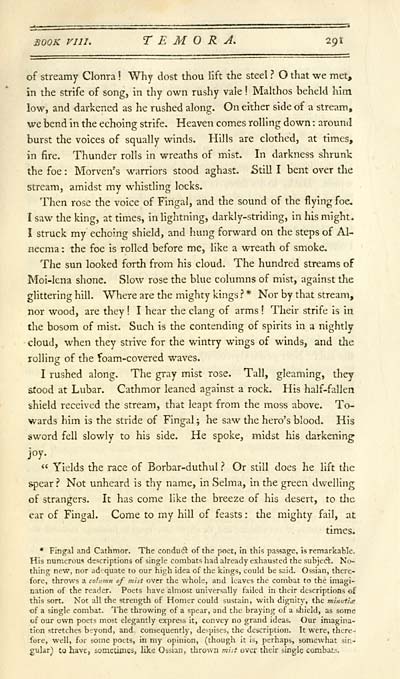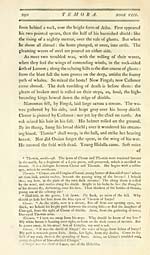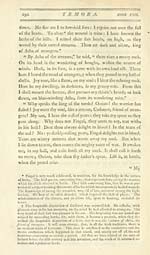Download files
Complete book:
Individual page:
Thumbnail gallery: Grid view | List view

sooK vjii. T E M O R A. apt
of streamy Clonra ! Why dost thou fift the steel ? O that we met,
in the strife of song, in thy own rushy vale ! Malthos beheld him
low, and darkened as he rushed along. On either side of a stream,
we bend in the echoing strife. Heaven comes rolling down : around
burst the voices of squally winds. Hills are clothed, at times,
in fire. Thunder rolls in wreaths of mist. In darkness shrunlc
the foe : Morven's warriors stood aghast. Still I bent over tlie
stream, amidst my wliistling locks.
Then rose the voice of Fingal, and the sound of the flying foe.
I saw the king, at times, in lightning, darkly-striding, in his might.
I struck my echoing shield, and hung forward on the steps of Al-
necma : the foe is rolled before me, like a wreath of smoke.
The sun looked forth from his cloud. The hundred streams of
Moi-Iena shone. Slow rose the blue columns of mist, against the
glittering hill. Where are the mighty kings ? * Nor by that stream,
nor wood, are they ! I hear the clang of arms ! Their strife is in
the bosom of mist. Such is the contending of spirits in a nightly
cloud, when they strive for the wintry wings of winds, and the
rolling of the foam-covered waves.
I rushed along. The gray mist rose. Tall, gleaming, they
stood at Lubar. Cathmor leaned against a rocL His half-fallen
shield received the stream, that leapt from the moss above. To-
wards him is the stride of Fingal ; he saw the hero's blood. His
sword fell slowly to his side. He spoke, midst his darkening
joy.
« Yields the race of Borbar-duthul ? Or still does he lift the
spear ? Not unheard is thy name, in Selma, in the green dwelling
of strangers. It has come like the breeze of his desert, to die
ear of Fingal. Come to my hill of feasts : the mighty fail, at
times.
• Fingal and Cathmor. The conduft of the poet, in this passage, is remarkable.
His numerous descriptions of single combats had already exhausted the subjecfl. No-
thing new, nor adiquate to our high Idea of the kings, could be said. Ossian, there-
fore, throws a column of mist over the whole, and leaves the combat to the imagi-
nation of the reader. Poets have almost universally failed in their descriptions of
this sort. Not all the strength of Homer could sustain, with dignity, the minidits
of a single combat. The throwing of a spear, and tlie braying of a shield, as some
of our own poets most elegantly express it, convey no grand ideas. Our imagina-
tion stretches beyond, and consequently, despises, the description. It were, there-
fore, well, for some poets, in my opinion, (though it is, perhaps, somewhat sin-
gular^ to have, sotaeumes, like Ossian, thrown m'ut over their single combat-s.
of streamy Clonra ! Why dost thou fift the steel ? O that we met,
in the strife of song, in thy own rushy vale ! Malthos beheld him
low, and darkened as he rushed along. On either side of a stream,
we bend in the echoing strife. Heaven comes rolling down : around
burst the voices of squally winds. Hills are clothed, at times,
in fire. Thunder rolls in wreaths of mist. In darkness shrunlc
the foe : Morven's warriors stood aghast. Still I bent over tlie
stream, amidst my wliistling locks.
Then rose the voice of Fingal, and the sound of the flying foe.
I saw the king, at times, in lightning, darkly-striding, in his might.
I struck my echoing shield, and hung forward on the steps of Al-
necma : the foe is rolled before me, like a wreath of smoke.
The sun looked forth from his cloud. The hundred streams of
Moi-Iena shone. Slow rose the blue columns of mist, against the
glittering hill. Where are the mighty kings ? * Nor by that stream,
nor wood, are they ! I hear the clang of arms ! Their strife is in
the bosom of mist. Such is the contending of spirits in a nightly
cloud, when they strive for the wintry wings of winds, and the
rolling of the foam-covered waves.
I rushed along. The gray mist rose. Tall, gleaming, they
stood at Lubar. Cathmor leaned against a rocL His half-fallen
shield received the stream, that leapt from the moss above. To-
wards him is the stride of Fingal ; he saw the hero's blood. His
sword fell slowly to his side. He spoke, midst his darkening
joy.
« Yields the race of Borbar-duthul ? Or still does he lift the
spear ? Not unheard is thy name, in Selma, in the green dwelling
of strangers. It has come like the breeze of his desert, to die
ear of Fingal. Come to my hill of feasts : the mighty fail, at
times.
• Fingal and Cathmor. The conduft of the poet, in this passage, is remarkable.
His numerous descriptions of single combats had already exhausted the subjecfl. No-
thing new, nor adiquate to our high Idea of the kings, could be said. Ossian, there-
fore, throws a column of mist over the whole, and leaves the combat to the imagi-
nation of the reader. Poets have almost universally failed in their descriptions of
this sort. Not all the strength of Homer could sustain, with dignity, the minidits
of a single combat. The throwing of a spear, and tlie braying of a shield, as some
of our own poets most elegantly express it, convey no grand ideas. Our imagina-
tion stretches beyond, and consequently, despises, the description. It were, there-
fore, well, for some poets, in my opinion, (though it is, perhaps, somewhat sin-
gular^ to have, sotaeumes, like Ossian, thrown m'ut over their single combat-s.
Set display mode to: Large image | Transcription
Images and transcriptions on this page, including medium image downloads, may be used under the Creative Commons Attribution 4.0 International Licence unless otherwise stated. ![]()
| Early Gaelic Book Collections > Ossian Collection > Poems of Ossian, the son of Fingal > (303) |
|---|
| Permanent URL | https://digital.nls.uk/77926884 |
|---|
| Description | Selected books from the Ossian Collection of 327 volumes, originally assembled by J. Norman Methven of Perth. Different editions and translations of James MacPherson's epic poem 'Ossian', some with a map of the 'Kingdom of Connor'. Also secondary material relating to Ossianic poetry and the Ossian controversy. |
|---|
| Description | Selected items from five 'Special and Named Printed Collections'. Includes books in Gaelic and other Celtic languages, works about the Gaels, their languages, literature, culture and history. |
|---|

